power of pope in the europe age oldspptx
Download as PPTX, PDF0 likes37 views
deep understand
1 of 8
Download to read offline
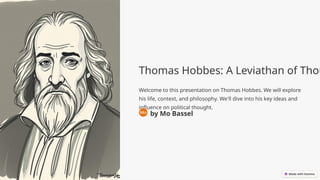
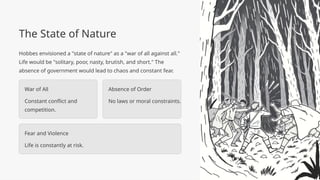
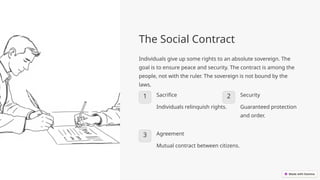
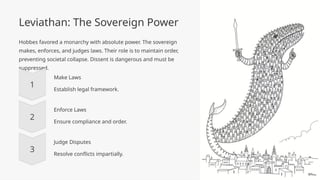

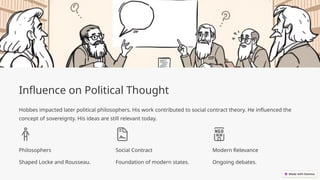
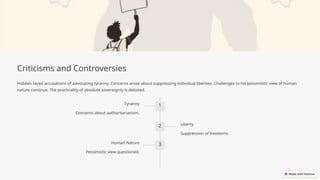
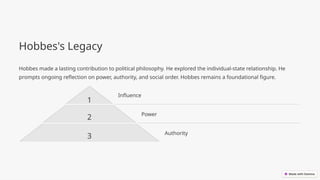
Ad
Recommended
Social Contract Theory by Hobbes, Locke and Rousseau
Social Contract Theory by Hobbes, Locke and RousseauWajidRaza7
?
This presentation is about social contract theory. It is covered by all possible anglesthomas hobbes
thomas hobbes qadrianum
?
This document provides an overview of Thomas Hobbes' political philosophy as outlined in his work Leviathan. It discusses Hobbes' social contract theory and the emergence of the sovereign authority. Hobbes argues humans surrender their freedoms and form a commonwealth, with the sovereign given absolute power to maintain peace and order. The document also summarizes Hobbes' views on human nature, the different forms of government, and criticisms of his philosophy.The passion to be reckoned upon is fear
The passion to be reckoned upon is fearKeisha Guerraro
?
This document provides an overview and analysis of Thomas Hobbes' social contract theory as presented in his work Leviathan. It discusses Hobbes' view of the state of nature as one of war and competition where life is "solitary, poor, nasty, brutish and short." To escape this state, individuals relinquish rights and authority to an absolute sovereign who establishes order and security through laws and punishments. The document argues that Hobbes' social contract is based primarily on fear - the fear of harm, death, and disorder in the state of nature forces individuals to consent to civil society for protection and peace. Overall, the social contract allows the sovereign to use punishments and laws to enforce order through instilling fear rather thanSocial contract theory by Thomas Hobbes, John Locke and JJ Rousseau
Social contract theory by Thomas Hobbes, John Locke and JJ RousseauCSS By Farman Mehmood AC
?
This PDF provides a detailed comparison of three influential philosophers—Thomas Hobbes, John Locke, and Jean-Jacques Rousseau—and their theories on the "Social Contract". It explores their differing views on human nature, government, rights, and freedom, offering key insights into modern political thought.
- Hobbes argues for an "absolute monarchy" to control humanity's chaotic state of nature.
- Locke ;emphasizes natural rights and a government based on consent, laying the groundwork for liberal democracy.
- Rousseau: advocates for direct democracy and the General Will, critiquing societal inequality.
With clear summaries, mind maps, and famous quotations, this resource is perfect for students, educators, and anyone interested in political philosophy.
Arranged by: Mr. Farman Mehmood Sarkani.Philosophers
Philosopherscaileigh
?
Thomas Hobbes believed that in a state of nature, life would be solitary, poor, nasty, brutish, and short due to people's natural inclination towards violence and self-interest. To escape this, individuals must surrender their freedom to an absolute sovereign who maintains order and security through rule of law.
John Locke believed that individuals are born free and equal, and have natural rights to life, liberty, and property. To protect these rights, people form civil societies and establish limited governments.
Jean-Jacques Rousseau believed that while humans are naturally good, the development of private property and unequal social structures have corrupted human nature and increased inequality. He advocated for direct democracy with elected representatives to balance theLiberalism Philosophers
Liberalism Philosopherssarahehr
?
The document discusses three influential political philosophers:
- Thomas Hobbes believed humans were selfish and needed an authoritarian ruler to maintain order. He saw the need for individuals to give up rights for protection and security.
- John Locke believed individuals were capable of reason and disagreed with the Church's authority. He advocated for a social contract where people received security and protection of property from the government, which should be accountable to the people.
- Jean-Jacques Rousseau opposed Locke's views of human nature and private property. He argued society and government should secure freedom, equality and justice for all regardless of the majority will.ETHICs: social contract theories lesson 2.1
ETHICs: social contract theories lesson 2.1alborojanmarie
?
Social contract theories assert that government legitimacy relies on the consent of the governed and explores the origins of morality, primarily through the works of Thomas Hobbes and John Locke. Hobbes advocates for a sovereign authority justified by a social contract that legitimizes governmental power, while Locke emphasizes natural rights and the government's role in their protection, allowing for rebellion if those rights are compromised. The discussion extends to the implications of natural rights ethics, including challenges in identifying such rights and their limited applicability to non-human matters.6Politics and Social ContractsPolitics and Social ContractsF.docx
6Politics and Social ContractsPolitics and Social ContractsF.docxevonnehoggarth79783
?
The document explores the foundational ideas of three philosophers—Thomas Hobbes, John Locke, and Jean Jacques Rousseau—regarding social contracts and human nature, which influenced the formation of key American political documents. It discusses Hobbes' belief in the necessity of social contracts for coexistence, Locke's view on inalienable rights, and Rousseau's emphasis on human compassion. Ultimately, these philosophies contributed to the development of the U.S. Constitution, the Bill of Rights, and the structure of the government today.Thomas hobbes
Thomas hobbesDr. Tripti Sharma
?
Thomas Hobbes was an English philosopher born in 1588 who is considered one of the founders of modern political philosophy. He studied at Oxford University and traveled throughout Europe, becoming interested in different forms of government. His most famous work was Leviathan, in which he argued that human nature is selfish and violent, and that life in a state of nature would be "solitary, poor, nasty, brutish and short." Hobbes believed people consent to a social contract establishing an absolute sovereign, such as a monarch, to maintain order and security. He viewed sovereignty as the foundation of civil government and advocated for strong, centralized states with absolute power.Property and the Collapse of the Soviet Union
Property and the Collapse of the Soviet Uniongharmon
?
The document discusses two theories on the origins of property - Thomas Hobbes' view that property emerges from the establishment of a sovereign to manage conflicts, and John Locke's view that property and natural rights exist independently of governments. It analyzes the failure of Marxist-Leninist regimes in Russia and other countries that abolished private property, suggesting this supports Hobbes' theory that property is necessary for social order and rights.Philosophers
PhilosophersAngela Cunningham
?
The document discusses several philosophers and their ideas about government and political theory during the Enlightenment period. It describes Thomas Hobbes's view of the social contract and belief in absolute monarchy. John Locke believed in natural rights and the idea that the people can overthrow a government that does not protect those rights. Jean-Jacques Rousseau wrote that government should express the will of the people. Baron de Montesquieu promoted separating government into branches with shared powers. These Enlightenment ideas influenced the American colonists in their rebellion against Britain.Social philosophy draft
Social philosophy draftsidhebeauty
?
The document discusses and compares the philosophies of Thomas Hobbes and Jean-Jacques Rousseau regarding human nature and the state of nature. It provides summaries of their key differences: for Rousseau, man is essentially peaceful in the state of nature, while for Hobbes man is selfish; Rousseau believed society corrupts while Hobbes saw the need for government to prevent war. The document also discusses how humans have both instinct and reason, and considers whether we were truly ever "born free" or have always been subject to controls and societal influences.Thomas Hobbes
Thomas Hobbesdipta chakma
?
Thomas Hobbes was an English philosopher who lived from 1588 to 1679. He studied at Oxford University and developed theories about political philosophy and human nature. Hobbes believed that in a state of nature without government, humans would be in a constant state of war due to seeking power over others. To escape this, humans form societies through social contracts that establish sovereign authority like a monarch to maintain order and peace. Hobbes argued this absolute authority was the best form of government to restrain people's natural inclinations towards harming each other. His most influential work was Leviathan, published in 1651.7th lecture
7th lectureMunir Hussain
?
The document discusses social contract theory as proposed by Thomas Hobbes, John Locke, and Jean Jacques Rousseau. Hobbes viewed the state of nature as one of constant war where life was "solitary, poor, nasty, brutish and short." He believed people formed societies and ceded power to sovereign authorities to escape this state of nature. Locke saw the state of nature in a more positive light but argued societies were formed to impartially judge disputes. Rousseau believed people were inherently good but formed societies to fulfill their moral duties and achieve true humanity.The Political philosophy of Thomas Hobbes
The Political philosophy of Thomas HobbesNoel Jopson
?
Thomas Hobbes was an English philosopher who argued that people were naturally self-interested and could not be trusted to govern themselves. In his most famous work, Leviathan, he proposed that the absolute monarchy was the best form of government because it concentrated all power in the hands of a sovereign, like a king, who could enforce order and security. Hobbes believed that without a powerful central authority, humanity would revert to a "state of nature" characterized by insecurity, conflict, and a "war of all against all."Social contract theory
Social contract theoryMahesh Patil
?
The document summarizes key concepts of social contract theory according to Thomas Hobbes, John Locke, and Jean-Jacques Rousseau. Hobbes viewed the state of nature as dangerous and advocated for absolute monarchy to maintain order. Locke believed the state of nature allowed for rational self-governance and advocated for representational democracy and protection of property rights. Rousseau viewed the state of nature positively and humans as inherently good, advocating for direct democracy and for individuals to submit to the general will of the people.Social Contract Theory pptx
Social Contract Theory pptxWkaar
?
Social Contract Theory proposes that individuals in a state of nature came together to form societies and governments through an implicit agreement, or social contract. The key thinkers on social contract theory - Thomas Hobbes, John Locke, and Jean-Jacques Rousseau - each proposed different views of human nature, the state of nature, and the role of the sovereign. While Hobbes argued for absolute monarchy, Locke advocated for limited monarchy and representational democracy, and Rousseau favored direct democracy with the people as sovereign.Philosophers for Social 30-2
Philosophers for Social 30-2McRae
?
Thomas Hobbes believed that humans are inherently selfish and egoistic, and that a peaceful society requires an absolute ruler with total control to enforce laws and prevent chaos. However, he also argued that subjects retain certain natural liberties or rights, such as the right to defend their own lives, that cannot be transferred away.
John Locke disagreed with Hobbes' view of absolute rule and believed that humans form societies through social contracts for impartial justice and protection of private property rights. Locke emphasized that governments are appointed by and responsible to the people, who hold the ultimate authority. He argued that the most important individual right is the right to own private property, as it stems from one's own labor.
John Stuart Mill warnedPolitical theory vs. political ideology2
Political theory vs. political ideology2Abir Chaaban
?
1. Political theory aims to study facts and trends in society and develop universal concepts to describe, explain, and evaluate human life, as well as predict future patterns. It includes both empirical and normative approaches.
2. Contractual theories of sovereignty emerged to address the problem of legitimacy during conflicts, proposing people consent to a sovereign's authority in exchange for security and order.
3. In Lebanon, Arab nationalism, Syrian nationalism, and Phoenicianism developed as competing ideologies following World War I, each promoting a different vision of national identity and sovereignty.Hobbes: Leviathan
Hobbes: Leviathanbrianbelen
?
The document provides an overview of social contract theory as articulated by Thomas Hobbes in his work 'Leviathan,' emphasizing the nature of man and the state of nature, characterized by conflict and competition. Hobbes argues that individuals, driven by insatiable desires for power, willingly cede their rights to a sovereign authority to ensure social order and enforce laws. Consequently, governments emerge from voluntary consent to maintain stability and justice in society.Thomas hobbes
Thomas hobbessabir_patel
?
Hobbes aimed to understand how social order is possible given human nature. He viewed humans as being in a state of nature characterized by a war of "all against all" due to humans' natural competitive desires and insecurities. Without a sovereign power to enforce rules, life would be "solitary, poor, nasty, brutish, and short." To escape this state of nature and achieve peace, Hobbes argued people consent to a social contract establishing an absolute sovereign with a monopoly on power. In his influential work Leviathan, Hobbes laid out this social contract theory and argued for strong central government to maintain order and avoid civil war.· Minimum of 1 scholarly sourceIntroductionSocial contract the.docx
· Minimum of 1 scholarly sourceIntroductionSocial contract the.docxalinainglis
?
The document discusses the perspectives of social contract theorists, particularly Hobbes and Locke, on morality and government authority. Hobbes argues that self-interest leads to the creation of moral rules necessary for social order, while Locke contends that the state should protect citizens' natural rights, advocating for rebellion when the government fails. The document prompts readers to reflect on their own philosophical beliefs regarding government authority and the trade-offs between personal safety and individual rights.Thomas Hobbes
Thomas Hobbesnilda Baggay
?
Thomas Hobbes (1588-1679) was an English philosopher who is considered one of the founders of modern political philosophy. He studied at Oxford University and traveled throughout Europe, experiencing different forms of government. Hobbes believed humans were inherently selfish and without rules or authority would live in a "war of all against all." He argued the best form of government was an absolute monarchy that imposed order through a strong central authority figure like a king. His most famous work was Leviathan, published during the English Civil War, where he made the case that people could not be trusted to govern themselves and needed an absolute ruler to maintain peace and security.THOMAS HOBBES’ MECHANISTIC VIEW OF THE HUMAN SOCIETY
THOMAS HOBBES’ MECHANISTIC VIEW OF THE HUMAN SOCIETYgershom habile
?
This document provides biographical details about Thomas Hobbes and summarizes his philosophical views. It discusses how Hobbes was influenced by Galileo's mechanical view of motion and the English Civil War. Hobbes believed that all human actions and the development of society could be explained through bodies in motion, with one event causing another in a mechanical process. The document then examines Hobbes' analysis of motion in physical and human bodies. It explores his views on cognitive powers, passions, and the state of nature. Hobbes argued that in the state of nature life was "solitary, poor, nasty, brutish and short" and that the creation of an absolute sovereign was necessary to establish peace and security.Social philosophy group 2 presentation
Social philosophy group 2 presentationsidhebeauty
?
The document provides a summary of a discussion between four individuals on the philosophies of Thomas Hobbes and Jean-Jacques Rousseau regarding human nature and the relationship between individuals and society. The discussion touches on whether humans were ever truly "born free" and examines different perspectives on the balance between individual liberty and living within the constraints of laws and social norms. While some view society as inherently oppressive, others acknowledge that humans require order and community to survive. Finding the right balance between state power and individual freedom is a complex debate that continues today.Week 1, Lecture B Do We Need A GovernmentOften we use words .docx
Week 1, Lecture B Do We Need A GovernmentOften we use words .docxcelenarouzie
?
The document discusses the philosophical underpinnings of government, focusing on concepts of freedom, liberty, and the social contract as articulated by thinkers such as Hobbes, Locke, and Rousseau. It explores the necessity of government to avoid the chaos of the state of nature where absolute freedom can lead to suffering and conflict. The founders of America aimed to create a government that balances individual rights and social order, reflecting these philosophical ideas through the U.S. Constitution.Internet Quiz - Finals || Aditya Shiva Sharma, Druva and Haaziq || Midnight Q...
Internet Quiz - Finals || Aditya Shiva Sharma, Druva and Haaziq || Midnight Q...BITS Goa Quiz Club
?
Midnight QuizThe Conspiracies Quiz || QM: Vagarth Dvivedi || Waves 2024 QuizFest || Midnig...
The Conspiracies Quiz || QM: Vagarth Dvivedi || Waves 2024 QuizFest || Midnig...BITS Goa Quiz Club
?
first every midnight quizMore Related Content
Similar to power of pope in the europe age oldspptx (18)
Thomas hobbes
Thomas hobbesDr. Tripti Sharma
?
Thomas Hobbes was an English philosopher born in 1588 who is considered one of the founders of modern political philosophy. He studied at Oxford University and traveled throughout Europe, becoming interested in different forms of government. His most famous work was Leviathan, in which he argued that human nature is selfish and violent, and that life in a state of nature would be "solitary, poor, nasty, brutish and short." Hobbes believed people consent to a social contract establishing an absolute sovereign, such as a monarch, to maintain order and security. He viewed sovereignty as the foundation of civil government and advocated for strong, centralized states with absolute power.Property and the Collapse of the Soviet Union
Property and the Collapse of the Soviet Uniongharmon
?
The document discusses two theories on the origins of property - Thomas Hobbes' view that property emerges from the establishment of a sovereign to manage conflicts, and John Locke's view that property and natural rights exist independently of governments. It analyzes the failure of Marxist-Leninist regimes in Russia and other countries that abolished private property, suggesting this supports Hobbes' theory that property is necessary for social order and rights.Philosophers
PhilosophersAngela Cunningham
?
The document discusses several philosophers and their ideas about government and political theory during the Enlightenment period. It describes Thomas Hobbes's view of the social contract and belief in absolute monarchy. John Locke believed in natural rights and the idea that the people can overthrow a government that does not protect those rights. Jean-Jacques Rousseau wrote that government should express the will of the people. Baron de Montesquieu promoted separating government into branches with shared powers. These Enlightenment ideas influenced the American colonists in their rebellion against Britain.Social philosophy draft
Social philosophy draftsidhebeauty
?
The document discusses and compares the philosophies of Thomas Hobbes and Jean-Jacques Rousseau regarding human nature and the state of nature. It provides summaries of their key differences: for Rousseau, man is essentially peaceful in the state of nature, while for Hobbes man is selfish; Rousseau believed society corrupts while Hobbes saw the need for government to prevent war. The document also discusses how humans have both instinct and reason, and considers whether we were truly ever "born free" or have always been subject to controls and societal influences.Thomas Hobbes
Thomas Hobbesdipta chakma
?
Thomas Hobbes was an English philosopher who lived from 1588 to 1679. He studied at Oxford University and developed theories about political philosophy and human nature. Hobbes believed that in a state of nature without government, humans would be in a constant state of war due to seeking power over others. To escape this, humans form societies through social contracts that establish sovereign authority like a monarch to maintain order and peace. Hobbes argued this absolute authority was the best form of government to restrain people's natural inclinations towards harming each other. His most influential work was Leviathan, published in 1651.7th lecture
7th lectureMunir Hussain
?
The document discusses social contract theory as proposed by Thomas Hobbes, John Locke, and Jean Jacques Rousseau. Hobbes viewed the state of nature as one of constant war where life was "solitary, poor, nasty, brutish and short." He believed people formed societies and ceded power to sovereign authorities to escape this state of nature. Locke saw the state of nature in a more positive light but argued societies were formed to impartially judge disputes. Rousseau believed people were inherently good but formed societies to fulfill their moral duties and achieve true humanity.The Political philosophy of Thomas Hobbes
The Political philosophy of Thomas HobbesNoel Jopson
?
Thomas Hobbes was an English philosopher who argued that people were naturally self-interested and could not be trusted to govern themselves. In his most famous work, Leviathan, he proposed that the absolute monarchy was the best form of government because it concentrated all power in the hands of a sovereign, like a king, who could enforce order and security. Hobbes believed that without a powerful central authority, humanity would revert to a "state of nature" characterized by insecurity, conflict, and a "war of all against all."Social contract theory
Social contract theoryMahesh Patil
?
The document summarizes key concepts of social contract theory according to Thomas Hobbes, John Locke, and Jean-Jacques Rousseau. Hobbes viewed the state of nature as dangerous and advocated for absolute monarchy to maintain order. Locke believed the state of nature allowed for rational self-governance and advocated for representational democracy and protection of property rights. Rousseau viewed the state of nature positively and humans as inherently good, advocating for direct democracy and for individuals to submit to the general will of the people.Social Contract Theory pptx
Social Contract Theory pptxWkaar
?
Social Contract Theory proposes that individuals in a state of nature came together to form societies and governments through an implicit agreement, or social contract. The key thinkers on social contract theory - Thomas Hobbes, John Locke, and Jean-Jacques Rousseau - each proposed different views of human nature, the state of nature, and the role of the sovereign. While Hobbes argued for absolute monarchy, Locke advocated for limited monarchy and representational democracy, and Rousseau favored direct democracy with the people as sovereign.Philosophers for Social 30-2
Philosophers for Social 30-2McRae
?
Thomas Hobbes believed that humans are inherently selfish and egoistic, and that a peaceful society requires an absolute ruler with total control to enforce laws and prevent chaos. However, he also argued that subjects retain certain natural liberties or rights, such as the right to defend their own lives, that cannot be transferred away.
John Locke disagreed with Hobbes' view of absolute rule and believed that humans form societies through social contracts for impartial justice and protection of private property rights. Locke emphasized that governments are appointed by and responsible to the people, who hold the ultimate authority. He argued that the most important individual right is the right to own private property, as it stems from one's own labor.
John Stuart Mill warnedPolitical theory vs. political ideology2
Political theory vs. political ideology2Abir Chaaban
?
1. Political theory aims to study facts and trends in society and develop universal concepts to describe, explain, and evaluate human life, as well as predict future patterns. It includes both empirical and normative approaches.
2. Contractual theories of sovereignty emerged to address the problem of legitimacy during conflicts, proposing people consent to a sovereign's authority in exchange for security and order.
3. In Lebanon, Arab nationalism, Syrian nationalism, and Phoenicianism developed as competing ideologies following World War I, each promoting a different vision of national identity and sovereignty.Hobbes: Leviathan
Hobbes: Leviathanbrianbelen
?
The document provides an overview of social contract theory as articulated by Thomas Hobbes in his work 'Leviathan,' emphasizing the nature of man and the state of nature, characterized by conflict and competition. Hobbes argues that individuals, driven by insatiable desires for power, willingly cede their rights to a sovereign authority to ensure social order and enforce laws. Consequently, governments emerge from voluntary consent to maintain stability and justice in society.Thomas hobbes
Thomas hobbessabir_patel
?
Hobbes aimed to understand how social order is possible given human nature. He viewed humans as being in a state of nature characterized by a war of "all against all" due to humans' natural competitive desires and insecurities. Without a sovereign power to enforce rules, life would be "solitary, poor, nasty, brutish, and short." To escape this state of nature and achieve peace, Hobbes argued people consent to a social contract establishing an absolute sovereign with a monopoly on power. In his influential work Leviathan, Hobbes laid out this social contract theory and argued for strong central government to maintain order and avoid civil war.· Minimum of 1 scholarly sourceIntroductionSocial contract the.docx
· Minimum of 1 scholarly sourceIntroductionSocial contract the.docxalinainglis
?
The document discusses the perspectives of social contract theorists, particularly Hobbes and Locke, on morality and government authority. Hobbes argues that self-interest leads to the creation of moral rules necessary for social order, while Locke contends that the state should protect citizens' natural rights, advocating for rebellion when the government fails. The document prompts readers to reflect on their own philosophical beliefs regarding government authority and the trade-offs between personal safety and individual rights.Thomas Hobbes
Thomas Hobbesnilda Baggay
?
Thomas Hobbes (1588-1679) was an English philosopher who is considered one of the founders of modern political philosophy. He studied at Oxford University and traveled throughout Europe, experiencing different forms of government. Hobbes believed humans were inherently selfish and without rules or authority would live in a "war of all against all." He argued the best form of government was an absolute monarchy that imposed order through a strong central authority figure like a king. His most famous work was Leviathan, published during the English Civil War, where he made the case that people could not be trusted to govern themselves and needed an absolute ruler to maintain peace and security.THOMAS HOBBES’ MECHANISTIC VIEW OF THE HUMAN SOCIETY
THOMAS HOBBES’ MECHANISTIC VIEW OF THE HUMAN SOCIETYgershom habile
?
This document provides biographical details about Thomas Hobbes and summarizes his philosophical views. It discusses how Hobbes was influenced by Galileo's mechanical view of motion and the English Civil War. Hobbes believed that all human actions and the development of society could be explained through bodies in motion, with one event causing another in a mechanical process. The document then examines Hobbes' analysis of motion in physical and human bodies. It explores his views on cognitive powers, passions, and the state of nature. Hobbes argued that in the state of nature life was "solitary, poor, nasty, brutish and short" and that the creation of an absolute sovereign was necessary to establish peace and security.Social philosophy group 2 presentation
Social philosophy group 2 presentationsidhebeauty
?
The document provides a summary of a discussion between four individuals on the philosophies of Thomas Hobbes and Jean-Jacques Rousseau regarding human nature and the relationship between individuals and society. The discussion touches on whether humans were ever truly "born free" and examines different perspectives on the balance between individual liberty and living within the constraints of laws and social norms. While some view society as inherently oppressive, others acknowledge that humans require order and community to survive. Finding the right balance between state power and individual freedom is a complex debate that continues today.Week 1, Lecture B Do We Need A GovernmentOften we use words .docx
Week 1, Lecture B Do We Need A GovernmentOften we use words .docxcelenarouzie
?
The document discusses the philosophical underpinnings of government, focusing on concepts of freedom, liberty, and the social contract as articulated by thinkers such as Hobbes, Locke, and Rousseau. It explores the necessity of government to avoid the chaos of the state of nature where absolute freedom can lead to suffering and conflict. The founders of America aimed to create a government that balances individual rights and social order, reflecting these philosophical ideas through the U.S. Constitution.Recently uploaded (20)
Internet Quiz - Finals || Aditya Shiva Sharma, Druva and Haaziq || Midnight Q...
Internet Quiz - Finals || Aditya Shiva Sharma, Druva and Haaziq || Midnight Q...BITS Goa Quiz Club
?
Midnight QuizThe Conspiracies Quiz || QM: Vagarth Dvivedi || Waves 2024 QuizFest || Midnig...
The Conspiracies Quiz || QM: Vagarth Dvivedi || Waves 2024 QuizFest || Midnig...BITS Goa Quiz Club
?
first every midnight quizSeason 12_EP02 - Quiz Quiz Hota Hai.pptx
Season 12_EP02 - Quiz Quiz Hota Hai.pptxQuiz Club, Indian Institute of Technology, Patna
?
Weekly set conducted as part of season 12.How Enzo Zelocchi Leveraged 28 Million Followers to Build a Global Brand That...
How Enzo Zelocchi Leveraged 28 Million Followers to Build a Global Brand That...Enzo Zelocchi Fan Page
?
In a world dominated by fleeting trends and overnight fame, Enzo Zelocchi stands out as a rare blend of consistency, vision, and authenticity. With over 28 million followers across social media platforms, he hasn’t just built an audience — he’s cultivated a global community that believes in creativity, ambition, and purpose.Ganimatoonics Finals || QM: Agastya and Nikhil || Quark'25 || BITS Pilani, KK...
Ganimatoonics Finals || QM: Agastya and Nikhil || Quark'25 || BITS Pilani, KK...BITS Goa Quiz Club
?
Quark'25Ganimatoonics Prelims || QM: Agastya Sanyal and Nikhil Vinay || Quark'25 || B...
Ganimatoonics Prelims || QM: Agastya Sanyal and Nikhil Vinay || Quark'25 || B...BITS Goa Quiz Club
?
Quark'25Season 12 _ EP 01 _ Lieutenant Quiz.pptx
Season 12 _ EP 01 _ Lieutenant Quiz.pptxQuiz Club, Indian Institute of Technology, Patna
?
Weekly quiz conducted as part of season 12Ralf Schumacher_ The Shadow and the Spotlight in Formula One.docx
Ralf Schumacher_ The Shadow and the Spotlight in Formula One.docxvoice ofarticle
?
When the conversation turns to the most iconic names in the high-octane world of Formula One, it’s impossible to ignore the Schumacher legacy. While Michael Schumacher’s record-breaking career often takes center stage, his younger brother, Ralf Schumacher, has crafted a compelling and impressive racing story of his own — one that deserves to be told in full. Often introduced in the shadow of his elder sibling, Ralf refused to remain just "Michael's younger brother" for long. Instead, he emerged as a fierce competitor with raw talent, relentless determination, and a deep passion for racing that was evident from a very young age.
Growing up in the motorsport-rich environment of Germany, Ralf Schumacher began his racing journey on the local karting circuits, where he quickly displayed a natural flair for speed and control. It was here that he honed the skills that would one day propel him onto the world stage. Unlike many young drivers who fizzle out before reaching the top, Ralf steadily climbed the ranks, moving from national championships to the international arena with precision and maturity far beyond his years. His early years were marked by countless hours of training, setbacks that tested his resolve, and victories that fueled his ambition.
最新版美国堪萨斯州立大学毕业证(碍-厂迟补迟别毕业证书)原版定制
最新版美国堪萨斯州立大学毕业证(碍-厂迟补迟别毕业证书)原版定制taqyea
?
一比一还原堪萨斯州立大学毕业证/K-State毕业证书2025原版【q薇1954292140】我们专业办理澳洲大学毕业证成绩单,美国大学毕业证成绩单,英国大学毕业证成绩单,加拿大大学毕业证成绩单,新加坡大学毕业证成绩单,新西兰大学毕业证成绩单,韩国大学毕业证成绩单,日本大学毕业证成绩单。
【复刻一套堪萨斯州立大学毕业证成绩单信封等材料最强攻略,Buy Kansas State University Transcripts】
购买日韩成绩单、英国大学成绩单、美国大学成绩单、澳洲大学成绩单、加拿大大学成绩单(q微1954292140)新加坡大学成绩单、新西兰大学成绩单、爱尔兰成绩单、西班牙成绩单、德国成绩单。成绩单的意义主要体现在证明学习能力、评估学术背景、展示综合素质、提高录取率,以及是作为留信认证申请材料的一部分。
堪萨斯州立大学成绩单能够体现您的的学习能力,包括堪萨斯州立大学课程成绩、专业能力、研究能力。(q微1954292140)具体来说,成绩报告单通常包含学生的学习技能与习惯、各科成绩以及老师评语等部分,因此,成绩单不仅是学生学术能力的证明,也是评估学生是否适合某个教育项目的重要依据!
我们承诺采用的是学校原版纸张(原版纸质、底色、纹路)我们工厂拥有全套进口原装设备,特殊工艺都是采用不同机器制作,仿真度基本可以达到100%,所有成品以及工艺效果都可提前给客户展示,不满意可以根据客户要求进行调整,直到满意为止!
【主营项目】
一、工作未确定,回国需先给父母、亲戚朋友看下文凭的情况,办理毕业证|办理文凭: 买大学毕业证|买大学文凭【q薇1954292140】堪萨斯州立大学学位证明书如何办理申请?
二、回国进私企、外企、自己做生意的情况,这些单位是不查询毕业证真伪的,而且国内没有渠道去查询国外文凭的真假,也不需要提供真实教育部认证。鉴于此,办理美国成绩单堪萨斯州立大学毕业证【q薇1954292140】国外大学毕业证, 文凭办理, 国外文凭办理, 留信网认证
三.材料咨询办理、认证咨询办理请加学历顾问【微信:1954292140】堪萨斯州立大学毕业证购买指大学文凭购买,毕业证办理和文凭办理。学院文凭定制,学校原版文凭补办,扫描件文凭定做,100%文凭复刻。Retail Store Scavenger Hunt feat. MAD MONK
Retail Store Scavenger Hunt feat. MAD MONKjahudson
?
Retail store scavenger hunt for Mad Monk by Joel Hudson. Season 12 _ EP03 - The Coked up Quiz .pdf
Season 12 _ EP03 - The Coked up Quiz .pdfQuiz Club, Indian Institute of Technology, Patna
?
Weekly set conducted as part of season 12.最新版西班牙卡米洛何塞塞拉大学毕业证(鲍颁闯颁毕业证书)原版定制
最新版西班牙卡米洛何塞塞拉大学毕业证(鲍颁闯颁毕业证书)原版定制Taqyea
?
无法毕业?鉴于此购买文凭【q薇1954292140】修改卡米洛何塞塞拉大学成绩单电子版gpa让学历更出色,UCJC文凭制作流程确保学历真实性,文凭购买,毕业证办理,文凭办理只是基础业务。【q薇1954292140】一比一还原国外大学毕业证,定制国外大学学历,制作国外大学文凭,复刻国外大学毕业证书。想要真实感受卡米洛何塞塞拉大学最新版毕业证图片的品质点击查看详解,学位证1:1完美还原海外各大学毕业材料上的工艺:水印,阴影底纹,钢印LOGO烫金烫银,LOGO烫金烫银复合重叠。文字图案浮雕、激光镭射、紫外荧光、温感、复印防伪等防伪工艺。
主营项目:
1、真实教育部国外学历学位认证《西班牙毕业文凭证书快速办理卡米洛何塞塞拉大学在线制作本科毕业证》【q微1954292140】《论文没过卡米洛何塞塞拉大学正式成绩单》,教育部存档,教育部留服网站100%可查.
2、办理UCJC毕业证,改成绩单《UCJC毕业证明办理卡米洛何塞塞拉大学文凭购买最佳渠道》【Q/WeChat:1954292140】Buy Universidad Camilo José Cela Certificates《正式成绩单论文没过》,卡米洛何塞塞拉大学Offer、在读证明、学生卡、信封、证明信等全套材料,从防伪到印刷,从水印到钢印烫金,高精仿度跟学校原版100%相同.
3、真实使馆认证(即留学人员回国证明),使馆存档可通过大使馆查询确认.
4、留信网认证,国家专业人才认证中心颁发入库证书,留信网存档可查.
办理UCJC学历与学位证书投资未来的最佳途径【q微1954292140】办理西班牙UCJC本科学历,办理卡米洛何塞塞拉大学成绩单高质量保密的个性化服务高仿真还原西班牙文凭证书和外壳,定制西班牙卡米洛何塞塞拉大学成绩单和信封。毕业证定购UCJC毕业证【q微1954292140】毕业证文凭样本卡米洛何塞塞拉大学offer/学位证留学生学历学位认证书、留信官方学历认证(永久存档真实可查)采用学校原版纸张、特殊工艺完全按照原版一比一制作。帮你解决卡米洛何塞塞拉大学学历学位认证难题。
【如何快速办理《卡米洛何塞塞拉大学毕业证UCJC成绩单》Buy Universidad Camilo José Cela Transcripts】
购买日韩成绩单、英国大学成绩单、美国大学成绩单、澳洲大学成绩单、加拿大大学成绩单(q微1954292140)新加坡大学成绩单、新西兰大学成绩单、爱尔兰成绩单、西班牙成绩单、德国成绩单。成绩单的意义主要体现在证明学习能力、评估学术背景、展示综合素质、提高录取率,以及是作为留信认证申请材料的一部分。
卡米洛何塞塞拉大学成绩单能够体现您的的学习能力,包括卡米洛何塞塞拉大学课程成绩、专业能力、研究能力。(q微1954292140)具体来说,成绩报告单通常包含学生的学习技能与习惯、各科成绩以及老师评语等部分,因此,成绩单不仅是学生学术能力的证明,也是评估学生是否适合某个教育项目的重要依据!
Buy Universidad Camilo José Cela Diploma《正式成绩单论文没过》有文凭却得不到认证。又该怎么办?鉴于此,购买西班牙毕业证【q微1954292140】西班牙文凭购买,西班牙文凭购买,西班牙文凭定制,西班牙文凭补办。专业在线定制西班牙大学文凭,定做西班牙本科文凭,【q微1954292140】复制西班牙Universidad Camilo José Cela completion letter。在线快速补办西班牙本科毕业证、硕士文凭证书,购买西班牙学位证、卡米洛何塞塞拉大学Offer,UCJC卡米洛何塞塞拉大学毕业证书多少钱。Lit Quiz Finals || QM: Shivansh Verma, Dhruba Chatterjee & Suhani Timbadia ||...
Lit Quiz Finals || QM: Shivansh Verma, Dhruba Chatterjee & Suhani Timbadia ||...BITS Goa Quiz Club
?
Literature Quiz FinalsInternet Quiz - Prelims || Aditya Shiva Sharma, Druva and Haaziq || Midnight ...
Internet Quiz - Prelims || Aditya Shiva Sharma, Druva and Haaziq || Midnight ...BITS Goa Quiz Club
?
Midnight QuizHow Enzo Zelocchi Leveraged 28 Million Followers to Build a Global Brand That...
How Enzo Zelocchi Leveraged 28 Million Followers to Build a Global Brand That...Enzo Zelocchi Fan Page
?
Ad
power of pope in the europe age oldspptx
- 1. Thomas Hobbes: A Leviathan of Thou Welcome to this presentation on Thomas Hobbes. We will explore his life, context, and philosophy. We'll dive into his key ideas and influence on political thought. by Mo Bassel
- 2. The State of Nature Hobbes envisioned a "state of nature" as a "war of all against all." Life would be "solitary, poor, nasty, brutish, and short." The absence of government would lead to chaos and constant fear. War of All Constant conflict and competition. Absence of Order No laws or moral constraints. Fear and Violence Life is constantly at risk.
- 3. The Social Contract Individuals give up some rights to an absolute sovereign. The goal is to ensure peace and security. The contract is among the people, not with the ruler. The sovereign is not bound by the laws. 1 Sacrifice Individuals relinquish rights. 2 Security Guaranteed protection and order. 3 Agreement Mutual contract between citizens.
- 4. Leviathan: The Sovereign Power Hobbes favored a monarchy with absolute power. The sovereign makes, enforces, and judges laws. Their role is to maintain order, preventing societal collapse. Dissent is dangerous and must be suppressed. Make Laws Establish legal framework. Enforce Laws Ensure compliance and order. Judge Disputes Resolve conflicts impartially.
- 5. Hobbes's Materialism and Empiricism Hobbes viewed the universe as purely material. He stressed sensory experience as the source of knowledge. He rejected innate ideas. The universe is body, with dimensions of magnitude. Material Universe Reality consists of matter. Sensory Input Knowledge from experience. Rejection of Innate Ideas No pre-existing knowledge.
- 6. Influence on Political Thought Hobbes impacted later political philosophers. His work contributed to social contract theory. He influenced the concept of sovereignty. His ideas are still relevant today. Philosophers Shaped Locke and Rousseau. Social Contract Foundation of modern states. Modern Relevance Ongoing debates.
- 7. Criticisms and Controversies Hobbes faced accusations of advocating tyranny. Concerns arose about suppressing individual liberties. Challenges to his pessimistic view of human nature continue. The practicality of absolute sovereignty is debated. 1 Tyranny Concerns about authoritarianism. 2 Liberty Suppression of freedoms. 3 Human Nature Pessimistic view questioned.
- 8. Hobbes's Legacy Hobbes made a lasting contribution to political philosophy. He explored the individual-state relationship. He prompts ongoing reflection on power, authority, and social order. Hobbes remains a foundational figure. 1 Influence 2 Power 3 Authority